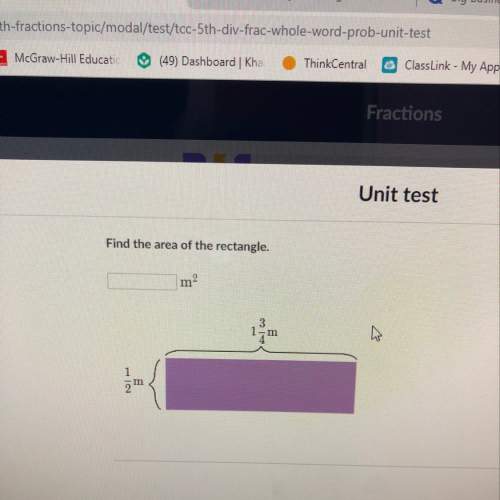
Mathematics, 30.07.2019 17:20 riyah03
Determine if the t is a linear transformation t(x1, x2, x3) = (-3x2, 4x3) o the function is a linear transformation o the function is not a linear transformation. if so, identify the matrix a such that t(x) = ax. (if the function is not a linear transformation, enter dne into any cell.) if not, explain why not o the function is a linear transformation o the function is not a linear transformation, since there exist numbers a, b, c, d, e, and f such that t(a + d, b e, c + f) # t(a, b, c) + t(d, e, f. o the function is not a linear transformation, since there exist numbers a, b, c, d, e, and f such that t(a + d, b + e, c + = πα, b, c) + t(d, e, f o the function is not a linear transformation, since there exist numbers a, b, c, and d such that t(a(b, c, d)) # at(b, c, d). o the function is not a linear transformation, since there exist numbers a, b, c, and d such that t(a(b, c, d)) = at(b, c, d).

Answers: 2


Another question on Mathematics

Mathematics, 21.06.2019 19:30
Awater holding tank measures 105 m long, 50 m wide, and 8 m deep. traces of mercury have been found in the tank, with a concen- tration of 60 mg/l. what is the total mass of mercury in the tank? answer in units of kg.
Answers: 1

Mathematics, 21.06.2019 23:20
Which shows a reasonable estimation for 124% of 42 using the distributive property?
Answers: 1

Mathematics, 22.06.2019 01:00
Mia’s gross pay is 2953 her deductions total 724.15 what percent if her gross pay is take-home pay
Answers: 2

Mathematics, 22.06.2019 02:00
Part a what is the area of triangle i? show your calculation. part b triangles i and ii are congruent (of the same size and shape). what is the total area of triangles i and ii? show your calculation. part c what is the area of rectangle i? show your calculation. part d what is the area of rectangle ii? show your calculation. part e rectangles i and iii have the same size and shape. what is the total area of rectangles i and iii? show your calculation. part f what is the total area of all the rectangles? show your calculation. part g what areas do you need to know to find the surface area of the prism? part h what is the surface area of the prism? show your calculation. part i read this statement: “if you multiply the area of one rectangle in the figure by 3, you’ll get the total area of the rectangles.” is this statement true or false? why? part j read this statement: “if you multiply the area of one triangle in the figure by 2, you’ll get the total area of the triangles.” is this statement true or false? why?
Answers: 1
You know the right answer?
Determine if the t is a linear transformation t(x1, x2, x3) = (-3x2, 4x3) o the function is a linear...
Questions

Law, 30.04.2021 17:50




English, 30.04.2021 17:50



Mathematics, 30.04.2021 17:50

Chemistry, 30.04.2021 17:50




Mathematics, 30.04.2021 17:50


History, 30.04.2021 17:50

Business, 30.04.2021 17:50

Mathematics, 30.04.2021 17:50








